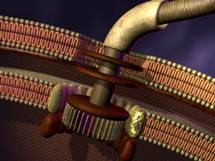The definition of science that is being disseminated nowadays wants to exclude from the start all possible consideration of a supernatural origin of life and of the creation of species, and extends the naturalistic methodology to all fields. In the words of astrophysicist and evolutionist Carl F. von Weizsäcker:
"It is not by its conclusions but by its methodological starting point that modern science excludes direct creation. Our methodology would not be honest if we denied this fact. We do not possess positive proof of the inorganic origin of life or of the primate ancestry of man, perhaps not even of evolution itself if we want to be pedantic. ..."
The Relevance of Science,
Collins, London and Glasgow,
1964, p. 136].
In this same work he continues saying:
"We do not yet understand the causes of evolution too well, but we have very little doubt about the fact of evolution; ... What are the reasons for this general belief? In the last lecture I formulated them negatively: We do not know how life should have come to exist in its actual form by any other way. This formulation leaves silently aside any possible supernatural origin of life; such is the faith in science of our time which we all share."
ibid., p. 141.
These words, taken from the Gifford Lectures pronounced in the Winter of 1959-60 by von Weizsäcker, are not an isolated case. This attitude is still the norm, as we can see in a statement not so far back in time as the one by Weizsäcker. In a remarkably candid essay in the New York Review of Books (Jan. 9, 1997), Lewontin explained the true basis of evolutionary science. There, Lewontin expounded his low opinion of the adaptationist "just-so" stories of the neo-Darwinists. In spite of his skepticism about Neodarwinism, however, he accepts the basic story of evolutionary naturalism because, in his own words,
"... we have a prior commitment, a commitment to materialism. It is not that the methods and institutions of science somehow compel us to accept a material explanation of the phenomenal world, but, on the contrary, that we are forced by our a priori adherence to material causes to create an apparatus of investigation and a set of concepts that produce material explanations, no matter how counterintuitive, no matter how mystifying to the uninitiated. Moreover, that materialism is absolute, for we cannot allow a Divine Foot in the door."
Richard Lewontin,
New York Review of Books
(January 9, 1997, p. 31)
(Emphasis added).
The logical question is: Is this legitimate? The academic Establishment insists in the proposal that "science" is the search of NATURAL explanations for the phenomena that sorrounds us and for our own existence.
That which may be object of repeated observations, or of repeatable experiments, in relation to causes and effects which may operate in it and of the effects produced by the said causes, is the legitimate field for the naturalistic methodology. But it is not legitimate to exclude intelligent design from the equation when we are dealing with something qualitatively different, as it is the case of the ORIGIN of the system whose operation we are studying by means of the naturalistic method.
- The OPERATION of a system is one thing.
- Another very different thing is the ORIGIN of the said system.
It would be far better to open the debate on origins, instead of maintaining the naturalistic methodology in a dogmatic way, and to begin an investigation of LOGICAL answers, not necessarily NATURAL ones, in what has to do with origins. The approach proposed by Weizsäcker, Lewontin and a host of other researchers prejudges the result from the beginning, as they themselves acknowledge. And, with this, they confuse the study of the operation of a system (the forces operating in the same and the effects of these forces) with the origin of the said system, as if the forces that operate in the said system should explain the origin itself of the system, and with this they ignore a fundamental difference between origin, on the one hand, and operation on the other.
Darwin himself acknowledged the legitimacy of the debate, at the beginning itself of this speculative work The Origin of Species, when he recognized that:
"... I am well aware that scarcely a single point is discussed in this volume on which facts cannot be adduced, often apparently leading to conclusions directly opposite to those at which I have arrived. A fair result can be obtained only by fully stating and balancing the facts and arguments on both sides of each question. ..."
On The Origin of Species by
Means of Natural Selection
[Introduction], 1859.
As to the false materialistic approach of "religion versus science", it tries to bypass the essence of the matter. It is evident that the matter of origins suffers from influences and has consequences as to the worldview, but these consequences and these influences appear on all sides. It is correct to identify them. But they should not determine the analysis of evidence. Although Irreducible Complexity (IC) and Intelligent Design (ID) have clear theistic CONSEQUENCES, naturalistic methodology has evident philosophical atheistic assumptions which imply an atheistic perspective of life. Are the atheistic assumptions legitimate as a foundation and as a framework for the research of these matters, with the atheistic analysis of the origin of life that they comport? Do they accord with the evidence?
As the agnostic researcher Denton has acknowledged, the thesis of Design is not founded on religious considerations, although it may have religious consequences. He expounds it in this way in his book Darwinism: A Theory in Crisis (Burnett Books, London 1985, p. 341):
"The almost irresistible force of the analogy has completely undermined the complacent assumption, prevalent in biological circles over most of the past century, that the design hypothesis can be excluded on the grounds that the notion is fundamentally a metaphysical a priori concept and therefore scientifically unsound. On the contrary, the inference to design is a purely a posteriori induction based on a ruthlessly consistent application of the logic of analogy. The conclusion may have religious implications, but it does not depend on religious presuppositions."
Thus, the inference of an intelligent design in the origins is arrived at by means of an analysis and an evaluation of criteria extant in the system under observation. These criteria pertain to a rigorous "forensic" analysis, and allow to determine if something might have been produced by chance, or if it is due necessarily to a design, to a deliberate intention. However, by means of this design inference the identity of the Designer cannot be determined. Let's suppose, for example, that we study an industrial system composed of a sequence of robots with belts for the transfer of pieces, in an automated assembly process. We can study this automated manufactory system composed of industrial robots from different approaches:
1) We may proceed to study all aspects of its operation from the criteria of the forces that work in the same, and of the effects exerted on the several pieces that are fed from the different hoppers in different places of the system.
This will imply the observation of the structure and function of the different electromechanical, pneumatic and hydraulic devices, the measure of the electrical and mechanical forces applied, for the machining, assembly, bolting, as well as the study of processes like welding, trimming, painting in tanks, the study of electric circuitry and their distribution and application, as well as that of pneumatic and hydraulic conduits, together with the several pressures of fluids used in the different points for different functions.
Thus, the study of the diverse structures, functions, devices and fluids (electrical, pneumatic, hydraulic, etc.), as well as the wear and tear processes, will give us a clear idea of the OPERATION OF THE MACHINE and OF ITS MISSION (for example, the automated assembly of fridge compressors). And the deduction we will make from our study will evidently be that behind all this system we have the matter of its origin, which undeniably is due to the technical and inventive capability of the human mind. All this study brings us to the answer of the WHAT (what this is), the HOW (how it works), and up to a certain extent WHAT FOR (its purpose).
2) This way, by means of the detailed study of the parts and of the design of this system we can understand its mode of operation, and we will be able to deduct that it has its origin in the capability of human ingenuity. But with this data we cannot come to know the identity of its designer(s). The question of Who? cannot receive an answer by the method just described, as this method can only bring us to the point of showing us the existence of an intelligence, of a purpose and of means that have brought about the origin of the system. And the answer to this question of WHO?, as well as of the HOW? (how it was done), requires other methods of knowledge, which are different from the objective analysis of the system. It requires a personal communication with the engineers that had the idea for the robotic system for machining and assembly of the fridge compressors; in the case of the complex systems of the cell, it demands the personal communication from the Creator of the systems of life. This knowledge is beyond the capability of the scientific method, of the human analytic capability; its discovery is beyond the mere analysis of the system. A Revelation from the Creator is needed.
Santiago Escuain

